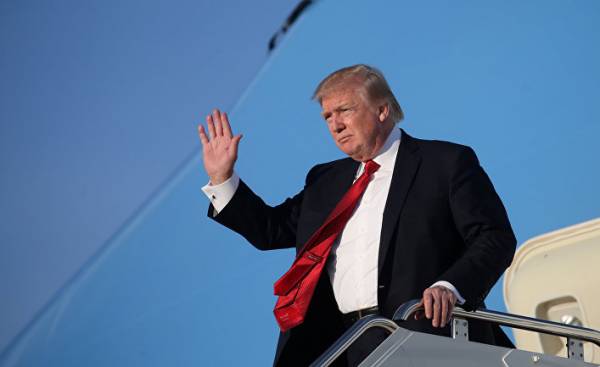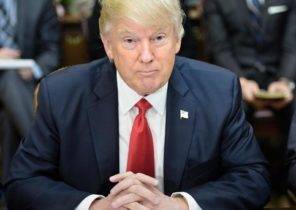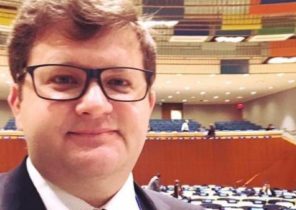
Pushing aside the long tradition of American exceptionalism, trump is gradually turning the US in a milder version of an authoritarian Russia. It is disturbing and demoralizing. However, it also may mean that American and Russian companies now have to contend with the same problems.
Americans have always thought a lot and talked about Russia, but this process was often intended to form and to Express a certain vision of America. Especially during the cold war in their attempts to understand the Soviet Union, many experts and journalists addicted to the Manichaean concept, in which Russia was considered the opposite of America. In the discussions around these two superpowers was not the place of the semitones. Western scholars and commentators specializing in Russia, as a rule, were convinced that they are on the more enlightened side of the Enlightenment: they professed the ideas of capitalism and respect for private property, the idea of the priority of truth, freedom, individualism, and choice, as well as higher moral values, which are often associated with faith in God. Those Americans who raised his eyes to heaven and looked down on Russia, had plenty of reasons to believe that the US is much better than the Soviet Union.
The America was a place markedly different from space, over which ruled the Kremlin. The USSR was a world dominated by coercion and deception, disrespect for private property, combined with materialism, which meant the spiritual void. All this was underpinned by assumptions about the internal disposition of the Russian people to tyranny, their unfulfilled pursuit of democracy, free market and consumer goods. You should not pay attention to hidden a contradiction here.
Of course, such distinctions are not always true. Moreover, they were not all and not always agree. Many Westerners admired Stalinist Russia for its very strong economic performance in the 1930-ies, when due to the rapid process of industrialization initiated by Stalin, Russia has left the Western economies far behind. Western thinkers, impressed by such a breakthrough, most often knew about the mass murders of Stalin that accompanied this impressive economic growth, becoming a kind of payback for him. However, they chose to ignore this information, believing that it is acceptable price for all the benefits that the Soviet people, as they believed, received in exchange: the ideal society, which communism promised and which Stalin, according to his words, began to build.
In scientific circles there was a slightly more detailed version of this Manichean concept. In the 1960s, many social historians began to treat the Soviet Union with greater sympathy. Driven by its relationship to systemic inequality in the United States, as well as his reaction to the us government’s war in Vietnam, they began to correct an obvious exaggeration of the knights of the cold war, often describing a Soviet Union as simply a slightly different manifestation of the norm. However, for the General public the debate remained obscure because they generally were conducted among historians or in the radical journals. The official version of the cold war continued to shape public perception of Russia and America and affect the way Americans saw their own country. And if the speech Ronald Reagan’s “evil Empire” was a reflection of this black-and-white perception of the world, the revolution of 1989 in Eastern Europe and the subsequent collapse of the Soviet Union helped to finally ground this way.
America’s triumphalism after the cold war strengthened the tendency of the US to pander to our desires, which fully emerged in the 1990-and 2000-ies. The obvious inferiority of the Soviet system even more fueled the arrogance of the USA. The same was done by Western scientists, who suddenly had access to the “declassified documents” of the former Communist regimes. Highlighting the fact that Stalin understood security as the need to constantly expand the territory, as well as his paranoid personality and his absolute political power as mandatory prerequisites for the start of the cold war, those historians came to the conclusion that the culprit of this global conflict was Russia. And outside the ivory tower very interesting scientific discussion on the inevitable economic and social suicide of the Soviet Union completely overshadowed by the powerful image of the wall of the well-known call Reagan turned to his Soviet counterpart: “Mr. Gorbachev, tear down that wall!”
Later, when Russia has closed on itself, trying to cope with the legacy of communism and the chaos of the reforms, the very cold war moved into the category of history that contributed to the separation of Russia’s past from the American present. In 1998, the distinguished historian John Lewis Gaddis (John Lewis Gaddis) quoted Groucho Marx (Groucho Marx) to emphasize the advantages of the new location. “The dog as book — man’s best friend, but know her inner world is the same what to read in the dark,” he wrote. Humor was also used to convey ideas about what the post-cold war American pop culture Russia has played a very minor role.
Remember Linda Litzke (played by McDormand (Frances McDormand)) of the Coen brothers movie “burn After reading”? When she transmits secret CIA documents to the Russian Embassy, it seems that even the CIA Director gets an unexpected message as to who it was she went. “Russian?” — he asks, incredulously priŝurivaâs’. These same Russian also reacted to the events with disbelief by meeting with an unexpected guest, assistant attache for cultural Affairs. Thus, new data and a fresh look at Russia gave a new impetus to the historical discipline, but also significantly reduce Russia’s role in the self-determination of America.
In attempts to restore Russia’s great power status and to heal the wounds to national pride, Putin tried to make Russia regained the role. After 1991, many in the West — if they even thought about it — considered that, despite the pain of the transition period, Russia will sooner or later become a liberal democracy. However, when Putin’s regime launched an attack on the opposition movement, the party and the newspaper, and began to use the courts and the police to achieve their political goals, the optimism of the representatives of the West began to rapidly evaporate. Under his administration, Russia started to come hard anti-liberal rhetoric, densely flavored with a sharp anti-Western and anti-American tones, forcing all those who watched, remember the contrasts and comparisons.
The media and government firmly condemned the real and the imaginary facts of intervention of America in the internal Affairs of Russia from fomenting anti-government protests in Russia and Ukraine and financing of non-governmental organizations, to attempts to expand the boundaries of NATO. In official rhetoric, America again became the sworn enemy of Russia. And Americans, in particular President Barack Obama, even more angered Russia by refusing to see it as an equal partner, which Russia is struggling to become tried.
Now we have a much more serious attitude towards Russia. This is because over the last two years, the Kremlin has demonstrated its readiness to build your Empire and destroy Western liberal democratic order. We pay much more attention in connection with the fact that the shadow of Russia hangs over the presidency of Donald trump from accusations of cybersexuality Russia in the course of the presidential election information about the numerous contacts of the team members trump with Russia. Now the mind no longer comes Comedy the Coen brothers as a cinematic analogue of the events in reality. The mind soon comes a terrible movie “the Manchurian candidate” in 1962.
Nevertheless, Russia’s presence in American politics and its impact on our future go beyond the obvious. The daily stream of news and tweets about the controversy surrounding trump and the endless repetition of the slogan “America first” we do not notice it persistent, historically significant and very troubling reinvention of America and turning it into a softer version of Russia. American politicians have too often relied on the exclusivity of the United States to justify its imperialistic policy in many parts of the world. But we should not forget that inherent in this country the sense of its uniqueness and its special mission contributed to the formation of “optimal methods”, the official values, standards and aspirations, as contrasted with the aspirations and values of various authoritarian regimes. Abandoning this tradition, trump says to the American people and the world that now we don’t care.
Donald trump rejects this tradition in their own interventions. Recall, for example, his bizarre attempts to replace the concept during an interview he gave to bill O’reilly (Bill O’reilly). Answering the leading comment that “Putin is assassin”, the President tried to turn the conversation, saying: “the world is full of killers. We also have a lot of murderers. Or do you think that our country is so innocent?” All right. You should not pay attention to the fact that such a critical view of the history of the United States voiced man who became President, categorically portraying Americans as victims of the rest of the world. It is not necessary to pay attention to what he was trying to put an equals sign between the two governments, which suffer from completely different imperfections: one of them, unfortunately, refuses to humanitarian principles, to protect its citizens (and regularly meets with resistance from human rights organizations and the media), and other uses such methods to intimidate their citizens and to silence all individuals and institutions who dare to Express their point of view out loud.
Trump more change America by their actions, imitating Putin’s style of government. This style involves the centralization and personalization of power at the expense of other branches of government and formal structures in General. Both phenomena are well known in Russia, but in USA they are unprecedented. This style also involves harassment and intimidation of critics — this practice is normal by Russian standards, and completely excluded from the American democracy — secrecy, overdependence on anti-liberal populism, which helps to play on the economic insecurity of ordinary people, racism, xenophobia, and a profound hypocrisy.
Stating that they protect ordinary citizens, Putin and trump simply bribes from them, at the same time turning the state into the machine for personal gain. Putin benefits from his position of head of the giant of corrupt, kleptocratic state. Not want to give up his business, trump turns the state into a marketing office of its own brand. Russian rulers were often considered public property as their own. Refusing to recognize a fundamental conflict of interest, trump is violating long-established rules, becoming the worst President that ever ruled America.
His foreign policy trump directly helps promotes Putin and his authoritarian program. Trump has already provoked confusion with his sharp tweets, phone calls and public statements regarding the most delicate aspects of international relations such as the longstanding conflict in East Asia and the middle East, questioned whether the existence of NATO, was inspired by European far-right movements seeking to destroy the European Union, and scared the rest — to quote a letter from the head of the European Council Donald Tusk addressed the European leaders “questioning the last 70 years of American foreign policy.”
He managed to insult at least one staunch ally of the US — Australia. Moreover, he justified the statements of ISIS (a terrorist organization banned in Russia — approx. ed.) about the clash of civilizations unleashed on Muslims and trying to force them out of the USA. Continuing to confuse the faithful allies and make new enemies in the middle East, trump directly helps Putin. Instead of protecting the principles of democracy and international cooperation, as did American presidents for the better part of the 20th century, the tramp plays with the world in Russian roulette.
However, the changes that trump brings to America, beyond its synergy with Putin’s Russia. The style of his government is very similar to the methods of America’s rival during the cold war — the Soviet state.
After the revolution of 1917, the Bolsheviks resolutely began to destroy the old world to create a new and better world they promised. For this they destroyed the monuments, symbols, institutions, and those people who dared to stand in their way. Then, with the 1930-ies, under the leadership of Stalin, they began to change the rural and urban landscapes across the Soviet Union and launched an attack on religion, art and whole classes of people who were against the regime, who were called enemies and which were treated as enemies only for the sake of the bureaucrats responsible for “exposing” the wreckers were able to meet their standards.
First of all, the Bolsheviks wanted to destroy the traditional value of truth. They monopolized the culture and media that allowed them to conceal their own crimes and errors, to mitigate the suffering of millions and force the masses to make sacrifices for a brighter future. All politicians one way or another distort the truth, but in Soviet Russia, the lie is systematic. It meant John Le carré (John Le Carré), when he wrote about “the classic, perpetual, all-Russian brazen, monstrous lie”.
Many historians have made their careers on the comparison of the two Soviet realities — virtual and real. It is important to give at least one example to explain our professionally motivated panic about the current situation in America. Take, for example, a ruthless policy of collectivization in agriculture, which started in 1929-1930. By the spring of 1930, hundreds of thousands of peasants become victims of violence, which the state sanctioned and to which it encouraged people: peasants were killed, deported, they took all the property and put a stigma on them “kulaks”.
However, in his article published in the newspaper “Pravda” Stalin stressed that this initiative was extremely successful. He cited impressive statistics regarding the speed of collectivization and quantity of grain, failed to mention the number of dead and injured. He used the numbers to say that “the turnaround of the village to socialism can be considered already provided.” Anyone who dared to doubt this statement, was threatened with prison or death. So many of them — did not dare to doubt. Some did not want to doubt, because Stalin gave them power and allowed them to benefit from these crimes — and the millions of people firmly believed that, no matter what happens, “the party is always right”.
Many cannot shake the feeling that trump also came to power to destroy. Rising on the wave of discontent is extremely imperfect status quo, he destroyed the mechanisms that could help fix the system. He robs the capacity of institutions, appointing to the position of their leaders incompetent people who don’t believe in the mission of these institutions. He destroys the society, exacerbating those deep divisions that have become an integral feature, suggesting his anger and hatred at a time when people desperately need to talk with each other and establish relations. It debases public debate, speaking from personal insults to judges and their critics, and violating diplomatic Protocol, and insulting the leaders of foreign States and those States themselves, he jeopardizes America’s relationship with the world.
As the Soviet government, trump seeks to destroy the traditional, fact-based idea of truth. In the virtual reality, which he, his advisers and representatives of relentless form, Donald trump really did win the vote of the electors, he complained during his inaugural speech, and the crowd gathered in front of the Capitol November 8 in numbers truly exceeded the crowd of Americans who gathered to welcome the previous 44 presidents. Sounds corny? But this is not the end.
In this imaginary reality, climate change is a fiction of Chinese, all Muslims are terrorists, independent judges who oppose Executive decrees trump, put the entire nation at risk, while the few magazines that manage to break through the flood of lies of the White house, becoming the mark of the distributors of “fake news”. The latter is very similar to the strategy which the Soviet Union enjoyed during the cold war. Remember the film Grigory Alexandrov “Meeting on the Elbe” in 1949, which American soldiers liberated Germany, are portrayed as a motley crowd of undisciplined drunkards. However, we all know that the tendency to drunkenness, violence and theft was common for soldiers of the red Army.
Most alarm calls consistency and perseverance of the team trump the dissemination of lies, their extraordinary sensitivity to even the most mild criticism, their tendency to respond to satire with rage, not their own humor, persistence with which they continue to defend false statements, despite the obvious evidence to the contrary, their constant exaggeration and on the whole an obvious tendency to define our complex reality in absolute terms. Remember: “Only I can fix it”. In the apocalyptic trunovskom perception of modern America, as reflected in his inaugural address, no place of restraint and the soft colors.
Attempt to isolate yourself from the outside world with a complete ban on immigration and a wall on the border implies a persistent desire to see the world in black and white: these measures can have a little comfort in these troubled times, but they are wrong. If we consider all this alone, it is possible to consider these figures of speech, forgivable errors or reservations. But together they form the pattern of “brazen, monstrous lie”, very reminiscent of the one which Le Carre was attributed to the Soviet government.
So, what can you conclude about the changed Russian-American relations? Such findings have at least two.
First, we must recognize that given the strong traditions of democracy and individualism, America may not be exposed to many Russian ills. But you also need to recognize that, given the determination trump to destroy the legal and political norms of their country, quite reckless and dangerous to try to see them as just good as it is doing now, many educated Americans. Because now we have every reason to believe that, if trump does not work, he may try to increase its popularity in America through war — as did Putin when his popularity began to decline as a result of falling oil prices.
Second, we must ask ourselves: can the failure of the trump from the long tradition of American exceptionalism in comparison with Russia mean that the Americans and the Russians, who support their home-grown authoritarian leaders no longer live in countries that are opposites to each other?
In many ways it really is. The true ideological and economic differences no longer divide US and Russia as they shared their before. On the contrary, many Americans and the Russians have long ago according to Express the same claims of democracy and capitalism, which betrayed them.
In Russia, the former Communist elite and criminal groups have stolen from the society of his capital accumulation and the system of social guarantees, leaving the weak to fend for themselves in this new ecosystem of “free market”. In the US, a great many citizens were victims of many years of state interference in the economy, to the carelessness of wall Street, aggressive globalization, fundamentally anti-democratic practices, such as lobbying and campaign financing — and it is justified by blind faith in the economy trickle down, magically mobilizing the power of “incentive” in a completely rational movement of the invisible hand, as well as the exceptional resilience and entrepreneurial instincts hardened by lives of Americans.
The Russian authorities use the laws at their discretion to support gangster capitalism, corruption and social inequality. In America, the neoliberal economic principles allowed big businessmen and congressmen to fix the selfishness and inequality in the laws. The result of all this hopelessness and despair largely determine the political choice of so many Americans and Russians. This is another reason that the Russian word “Putin” is so easy to translate into American English as “trump.”
And it doesn’t matter that neither trump nor Putin to protect the interests of the downtrodden. It is important that the masses believe their best option from those given below. President Donald trump is a symptom of a serious ailment that affects America: drawing its strength from the despair of the people, he feels entitled to lead the country as it makes Vladimir Putin. Then let us ask ourselves the question that the Russian people have often asked during the difficult periods of its history: what to do? We definitely should have a powerful resistance to rapprochement trump with Russia on Putin’s non-democratic settings. We must resist his attempts to change America in accordance with the principles and practices which formerly were characteristic of the authoritarian enemy the United States for the Soviet Union. But struggling with transom, we must clearly understand one thing: why millions of Americans like the fact that the current President carefully blurs the lines between the first opposing systems of values, identities and ideals?
The reason may be that American and Russian companies that inhabit a single capitalist space, face the same social and economic structural problems. In short, trump’s attempts to eradicate the tradition of exceptionalism, the United States, perhaps due to the fact that on a deeper level, America simply is no longer such an exclusive, as it was before.
Patrick Babiracki is Professor of history of Russia and Eastern Europe at the University of Texas at Arlington and editor of the journal Cultural History, published by Edinburgh University.







